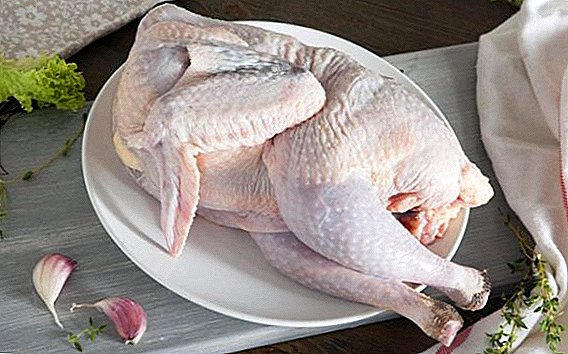
Today, poultry - a common branch of the economy. Some farmers breed chicken for meat, others for eggs, and others for young stock.
If the third option is chosen, then an incubator is used for procreation. But the process of incubating eggs has its moments, especially when it comes to storing eggs. We read in detail about this in the article. Watch a useful video.
What is an incubation egg?
 An incubated egg is an egg that is placed in an incubator or placed in a hen to incubate. Unlike table eggs, the incubation must necessarily have a germ..
An incubated egg is an egg that is placed in an incubator or placed in a hen to incubate. Unlike table eggs, the incubation must necessarily have a germ..
At poultry farms, all eggs that are intended to be laid in the incubator are checked with a special device for the presence of an embryo (read about the overscoping of chicken eggs and how it is carried out, read here, and from this material you will learn about the selection rules and check material for offspring). At home, the guarantee that the egg is incubatory is the coexistence of females with a rooster. Moreover, not all eggs can contain embryos.
Features of saving
The place where material will be stored should be well ventilated.. Since the shell is very thin and tender, it absorbs various odors and aromas. It is worth avoiding drafts that affect the evaporation of moisture. After all, it is so important for eggs.
Can it be stored at room temperature?
You can store material for the production of chickens at room temperature if it does not exceed 12-18 degrees. It is best to place the eggs on the windowsill with an open window leaf.
Term
If you observe the required temperature and humidity levels, then you can store eggs for 5-7 days. It is proved that if you hold the material before incubation at room temperature for a specified time, then the withdrawal of chickens is much better.
But the following factors affect the storage time.:
 air temperature and humidity;
air temperature and humidity;- the frequency of sanitary and preventive methods;
- the geographical location of the room in which the eggs will be located;
- genetic specificity of the hen;
- bird age;
- breed.
More information about the incubation period for chicken eggs can be found in this article.
Degrees
At what temperature should chicken eggs be stored? If the eggs are stored for more than 14 days, then it is worth maintaining the temperature regime of 8-12 degrees. If the material is no longer than 8 days, then the storage temperature of eggs may be at 15 degrees.
Allowed 2-day storage at a temperature within 18 degrees. This temperature is below the "physiological level" (19-27 degrees). So significant development of the embryo at this temperature is not observed.
IMPORTANT: Chicken embryo growth can recover at a temperature of 21-22 degrees. But with these indicators, its development is carried out abnormally: the blastodisk grows, there is no differentiation of the germ layers, deformity occurs and the development of the embryo is inhibited.
Table 1 - Temperatures
| Incubation period | Days | Temperature | Humidity | Turn | Ventilation |
| 1 | 1-7 | 37.8-38.0 ° C | 55-60% | 4-8 times a day | - |
| 2 | 8-14 | 37.8-38.0 ° C | 50% | 4-8 times a day | - |
| 3 | 15-18 | 37.8-38.0 ° C | 45% | 4-8 times a day | 2 times a day for 10-15 minutes |
| 4 | 19-21 | 37.5-37.7 ° C | 70% | - | - |
You can learn more about the mode of incubation of chicken eggs in different periods, as well as see the tables of the optimal temperature, humidity and other factors by day here.
Ways to maintain the desired heat
The stability of the temperature in the incubator depends on the comfort temperature in the room where the incubator is installed. This is especially true of the PVC wall incubator. Plastic conducts heat well if it is cold outside.
The maintenance of temperature is influenced by the volume of liquid that is concentrated in the incubator pan. The higher the water level, the more stable the temperature indicators of egg incubation are maintained.
In addition, it is imperative to ensure a regular flow of fresh air. At first, air exchange should be minimal. But as the embryos develop, air exchange increases. Air is very important in the last days, when the embryo switches to pulmonary respiration.:
 To prevent eggs from overheating, it is necessary to regularly measure the temperature on the surface of the material.
To prevent eggs from overheating, it is necessary to regularly measure the temperature on the surface of the material.- If the temperature has risen above normal, then cool. Its duration is 15-20 minutes.
- In summer, this manipulation is carried out 2 times a day. To do this, purge the air without removing eggs for 10-40 minutes. At the same time trays with material should be installed horizontally.
Consequences of abnormal conditions
Overheating eggs is a hyperthermia. Given the time effect of this factor, there are various changes in the development of the embryo.:
- If the temperature indices are raised to 40 degrees and higher, then during 2-3 hours in the first days of incubation, embryo death occurs and a large number of blood ruts are formed. Some of the embryos continue to develop with pronounced symptoms of various deformities.
Among them, it is worth noting the deformities of the head: non-growth or underdevelopment of the skull, because of which a brain hernia is formed, there is a unilateral or bilateral underdevelopment of the eyes - anisophthalmia.
- When overheating on the 3-6th day of incubation, the amnion and the abdominal cavity are formed. The latter remains open, in the internal organs - naked.
- When overheating occurs on average incubation days, the hyperemia of the germinal membranes and embryos occurs. They form hemorrhages under the skin and in the internal organs. The liquid amnion scarlet color, visible hemorrhages in the allantois.
- When overheating in the last incubation days, premature deposition and withdrawal take place. The chicks are small, and their umbilical cord heals poorly.
The process of incubating eggs is complex and responsible. In addition to the need to prepare high-quality material, it is also necessary to observe a number of conditions during its storage, one of which remains the normal temperature.
If he is constantly not followed up and exceeds the norm, but it is fraught with getting young stock with abnormalities and deformities.
This process is not as complicated as it seems at first glance, although it requires increased attention and responsibility.


 air temperature and humidity;
air temperature and humidity; To prevent eggs from overheating, it is necessary to regularly measure the temperature on the surface of the material.
To prevent eggs from overheating, it is necessary to regularly measure the temperature on the surface of the material.









